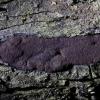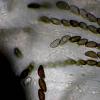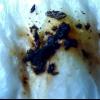
16-02-2026 18:34
 Thierry Blondelle
Thierry Blondelle
Bonjour,La micro de cet anamorphe de Hercospora su

08-12-2025 17:37
 Lothar Krieglsteiner
Lothar Krieglsteiner
20.6.25, on branch of Abies infected and thickened

16-02-2026 21:25
 Andreas Millinger
Andreas Millinger
Good evening,failed to find an idea for this fungu

16-02-2026 17:14
Joanne TaylorLast week we published the following paper where w

16-02-2026 16:53
Isabelle CharissouBonjour, quelqu'un pourrait-il me transmettre un

16-02-2026 11:53
Joeri Belisbetween leaf litter on twig in young salix growth.

14-02-2026 22:45
Hy!I would ask for some help determing this specie

13-02-2026 03:30
Hello! I found these immersed perithecia on a stic
Hypoxylon petriniae ?
Thierry Blondelle,
12-03-2023 10:11
 Hello !
Hello !I'm a new member from France.
I require your advise for this sample of Hypoxylon found on a dead branch of Fraxinus.
I think to H. petriniae with these inconspicuous perithecal mouds.
Ascospores: 12-10 x 4-5 µm with double guttula in most of them.
Thanks
Thierry Blondelle
Lothar Krieglsteiner,
12-03-2023 10:21

Re : Hypoxylon petriniae ?
Hello Thierry,
can you tell us which color the pigment extracted with 10% KOH has?
Yours, Lothar
can you tell us which color the pigment extracted with 10% KOH has?
Yours, Lothar
Thierry Blondelle,
12-03-2023 10:39
Jacques Fournier,
12-03-2023 15:53

Re : Hypoxylon petriniae ?
Hi Thierry,
you are likely right, but H. petriniae may be highly variable in colour and external appearence, making its identification sometimes challenging.
A good discriminating character from other species with orange pigments is the relatively weak thickness of the stromata, rarely over 0.5 mm thick, combined ith the small diameter of perithecia, mostly 0.3-0.4 mm diam.
Cheers,
Jacques
you are likely right, but H. petriniae may be highly variable in colour and external appearence, making its identification sometimes challenging.
A good discriminating character from other species with orange pigments is the relatively weak thickness of the stromata, rarely over 0.5 mm thick, combined ith the small diameter of perithecia, mostly 0.3-0.4 mm diam.
Cheers,
Jacques
Thierry Blondelle,
12-03-2023 18:06

Re : Hypoxylon petriniae ?
Thanks Jacques for these additionnal informations.




